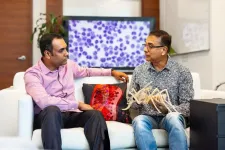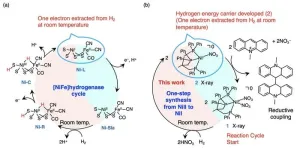(Press-News.org) The discovery of a malaria protein that helps the parasite grow inside red blood cells and plays a key regulatory role in the parasite’s immune evasion tactics could pave the way for new vaccines or therapeutics to combat the deadly infection.
The protein, known as PfAP2-P, was previously identified in a KAUST-led study that explored malarial genes and proteins displaying rhythmic 24-hour expression patterns — an adaptation that allows the parasite to synchronize its activities with those of the host during the human blood stage of its developmental cycle[1].
The expression levels of PfAP2-P seem to peak first around 16 hours after the invasion of red blood cells and then again some 24 hours after that. These peaks coincide with the activation of genes linked to two crucial biological processes. The first is when malaria parasites coat the red cells they infect with various combinations of sticky proteins to elude immune recognition and the second when groups of young parasites prepare to exit one red blood cell and invade other uninfected red cells.
This observation intrigued Amit Kumar Subudhi, a research scientist in Arnab Pain’s group. Together with Pain and collaborators from various other KAUST labs, he wanted to reveal PfAP2-P’s function.
Through a series of molecular experiments, they showed that PfAP2-P indeed serves as an essential regulator of multiple key biological processes of the parasites. The protein acts as both a repressor of genes involved in immune evasion and as a brake on genes associated with the parasite’s transition to its sexual stage of development.[2]
The researchers also identified several novel proteins that are directly or indirectly regulated by PfAP2-P, a few of which could be targeted for future drug development. Moreover, they discovered that PfAP2-P acts as an activator of the proteins required for the parasite to exit infected red blood cells and invade new ones.
Perhaps the most promising discovery came from studies on mutant malaria parasites that lacked a working version of PfAP2-P. These parasites could not control the coordinated expression of highly variable sticky proteins at the surface of the red cells involved in skirting immune detection.
Red cells infected with these PfAP2-P–defective parasites expressed the full array of sticky surface proteins, rather than employing the usual tactic of “hide and seek“ with the host immune recognition system. As a result, the PfAP2-P-defective parasites were readily recognized by malaria-destroying antibodies that, in principle, could help train the body to fend off naturally occurring malaria infections.
The KAUST researchers are currently exploring the potential of these mutant parasites as vaccine-like “immune triggers“ for warding off natural malaria infections in people.
END
Malaria protein discovery offers path for novel antimalarial intervention strategies
2023-10-26
ELSE PRESS RELEASES FROM THIS DATE:
Psoriasis not caused by spontaneous mutations in skin cells
2023-10-26
Psoriasis — a chronic skin condition — is not caused or spread by spontaneous genetic mutations in the skin, new research suggests.
The team, from the Wellcome Sanger Institute and collaborators, sequenced skin samples from 111 people with psoriasis. They didn’t find any mutated genes in the psoriatic patches that weren’t also mutated in the individual’s unaffected skin tissue.
The study, published today (26 October) in Nature Genetics, suggests that unlike other inflammatory diseases, such as inflammatory bowel disease or chronic liver disease, somatic mutations were not responsible for the start or spread of psoriasis.
Confirming that psoriasis ...
Marine protected areas and climate change
2023-10-26
An international team has developed the first comprehensive framework for designing networks of marine protected areas that can help vulnerable species survive as climate change drives habitat loss.
In a paper published Oct. 26 in One Earth, the researchers outlined guidelines for governments to provide long-distance larval drifters, like urchins and lobsters, as well as migratory species, like turtles and sharks, with protected stopovers along coastal corridors. Led by Stanford marine conservation scientist Nur Arafeh-Dalmau, the team included 50 scientists and practitioners ...
Genetics links endometriosis and IBS
2023-10-26
University of Queensland researchers have shown that endometriosis and irritable bowel syndrome (IBS) share genetic risk factors, explaining why patients with one condition may also have the other.
Professor Grant Montgomery and Dr Sally Mortlock at UQ’s Institute for Molecular Bioscience found a significant relationship between the risks for endometriosis and common gastrointestinal disorders such as IBS, peptic ulcer disease (PUD) and gastro-oesophageal reflux disease (GORD).
“This genetic finding supports the clinical observation of an increased incidence of gastrointestinal disorders in women with endometriosis,” ...
Regenstrief, VA researchers co-edit journal special supplement addressing far-reaching impact of EHR transitions
2023-10-26
INDIANAPOLIS -- Two Regenstrief Institute and U.S. Department of Veterans Affairs researchers are key leaders of a national journal’s special supplement designed to help address the plethora of issues that can accompany a healthcare system’s transition to a new electronic health record (EHR) system.
Regenstrief Institute’s David Haggstrom, M.D., MAS, and Michael Weiner, M.D., MPH, are among four guest editors who have spent the last two years leading content development for a Journal of General Internal Medicine (JGIM) special supplement ...
City of Hope, TGen awarded five-year, $4.5 million grant to advance liquid biopsy for pancreatic cancer
2023-10-26
LOS ANGELES and PHOENIX — City of Hope®, one of the largest cancer research and treatment organizations in the United States, and TGen are leading an international group that has been awarded $4.5 million to validate a liquid biopsy for the early detection of pancreatic cancer. The blood-based diagnostic developed by the National Cancer Institute’s Pancreatic Cancer Detection Consortium (PCDC) leverages exosomal microRNAs that serve as a biomarker or unique RNA fingerprint for the early detection of disease or recurrence.
Enrollment of patients with early-stage pancreatic ductal adenocarcinoma (PDAC), a ...
Mount Sinai receives $4.6 million from The Pershing Square Foundation to support women’s health research and careers for women in science
2023-10-26
(New York, NY – October 26, 2023) – The Icahn School of Medicine at Mount Sinai has received a $4.6 million gift from The Pershing Square Foundation to support women’s health research and advance careers for female scientists. Part of an original nearly $21 million gift that expanded a COVID-19 testing program for New York City schools and other organizations, this boost in women-focused initiatives connects The Pershing Square Foundation’s interest in supporting women in science to Mount Sinai’s leading researchers and key initiatives in gender-based science and health.
“We ...
Announcing the ADA Forsyth Institute: a world-class organization for oral health research and innovation
2023-10-26
SOMERVILLE, Mass., Oct. 26, 2023 – The American Dental Association (ADA) and the Forsyth Institute today announced the formation of the ADA Forsyth Institute, which brings together unparalleled talent, visionary research opportunities and dynamic innovation prospects, dedicated to advancing oral health through scientific innovation and research.
“The new ADA Forsyth Institute will continue to advance oral and overall health through ground-breaking research and innovation,” said Massachusetts Governor Maura Healey. “The Forsyth ...
Early whaling eradicated species from local waters
2023-10-26
The industrial whaling of the 19th and 20th centuries almost wiped out several species. However, even though whaling took place on a much smaller scale before this period, it was enough for at least two species to disappear completely from European waters.
These two species used to be among the most common, but now one of these species is on the verge of extinction.
“Whaling was widespread from a very early time. This had major consequences for species in Europe,” says Youri van den Hurk, a ...
Fungi used in food production could lead to new probiotics
2023-10-26
Washington, D.C. — Many fungus strains have been used and selected by the food industry for their capacities to ferment, produce flavors or produce heterologous molecules. According to a new study, 2 fungi used to produce food products have potential probiotic effects on gut inflammation. The study, published in mSystems, a journal of the American Society for Microbiology, demonstrates a possible new way to develop new probiotics.
“There is much to learn by studying the role of the ...
A potentially cheaper and 'cooler' way of hydrogen transport
2023-10-26
Fukuoka, Japan—In the continued effort to move humanity away from fossil fuels and towards more environmentally friendly energy sources, researchers in Japan have developed a new material capable storing hydrogen energy in a more efficient and cheaper manner. The new hydrogen energy carrier can even store said energy for up to three months at room temperature. Moreover, since the material is nickel based, its cost is relatively cheap. The results were reported in Chemistry—A European Journal.
As humanity combats the ongoing climate crisis, ...





